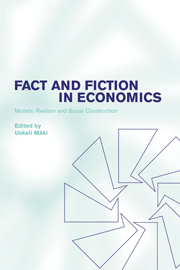Book contents
- Frontmatter
- Contents
- Notes on the contributors
- Preface
- I Introduction
- II Setting the scene
- 2 Ugly currents in modern economics
- 3 Modern economics and its critics
- 4 Some nonreasons for nonrealism about economics
- III Economic models and economic reality
- IV The constitution of economic reality
- V The institutions of economics
- Index
- References
4 - Some nonreasons for nonrealism about economics
Published online by Cambridge University Press: 22 September 2009
- Frontmatter
- Contents
- Notes on the contributors
- Preface
- I Introduction
- II Setting the scene
- 2 Ugly currents in modern economics
- 3 Modern economics and its critics
- 4 Some nonreasons for nonrealism about economics
- III Economic models and economic reality
- IV The constitution of economic reality
- V The institutions of economics
- Index
- References
Summary
Introduction
Many participants in the debate over the current state and recent developments of economics make claims that are unrefined, simplistic, often exaggerated. This is understandable: the stakes are high, the issues trigger emotional responses, and few participants are motivated or equipped to seek more nuanced analyses. To assert, or to deny, that economics as a scientific discipline or a particular part of it (such as a model) is about reality – or refers to reality, represents it, is true about it, or is truthlike about it – is to make a very complex and highly ambiguous claim. The disputants often make claims that have parallels in the philosophical controversy between scientific realists and their opponents, or at any rate those claims can be partly analyzed in terms of some of the arguments presented in this philosophical controversy. The question addressed here is whether realism about economics is a viable position. The argument proceeds by way of refuting a number of arguments against realism about economics. I suggest a genuine controversy over the factuality of any particular strand or piece of economics requires realism as a general interpretation of economics – or at any rate requires debunking the anti-realist arguments discussed below.
“The issue of realism” as most economists would recognize it, is not exactly the issue of realism as philosophers recognize it.
- Type
- Chapter
- Information
- Fact and Fiction in EconomicsModels, Realism and Social Construction, pp. 90 - 104Publisher: Cambridge University PressPrint publication year: 2002
References
- 14
- Cited by



